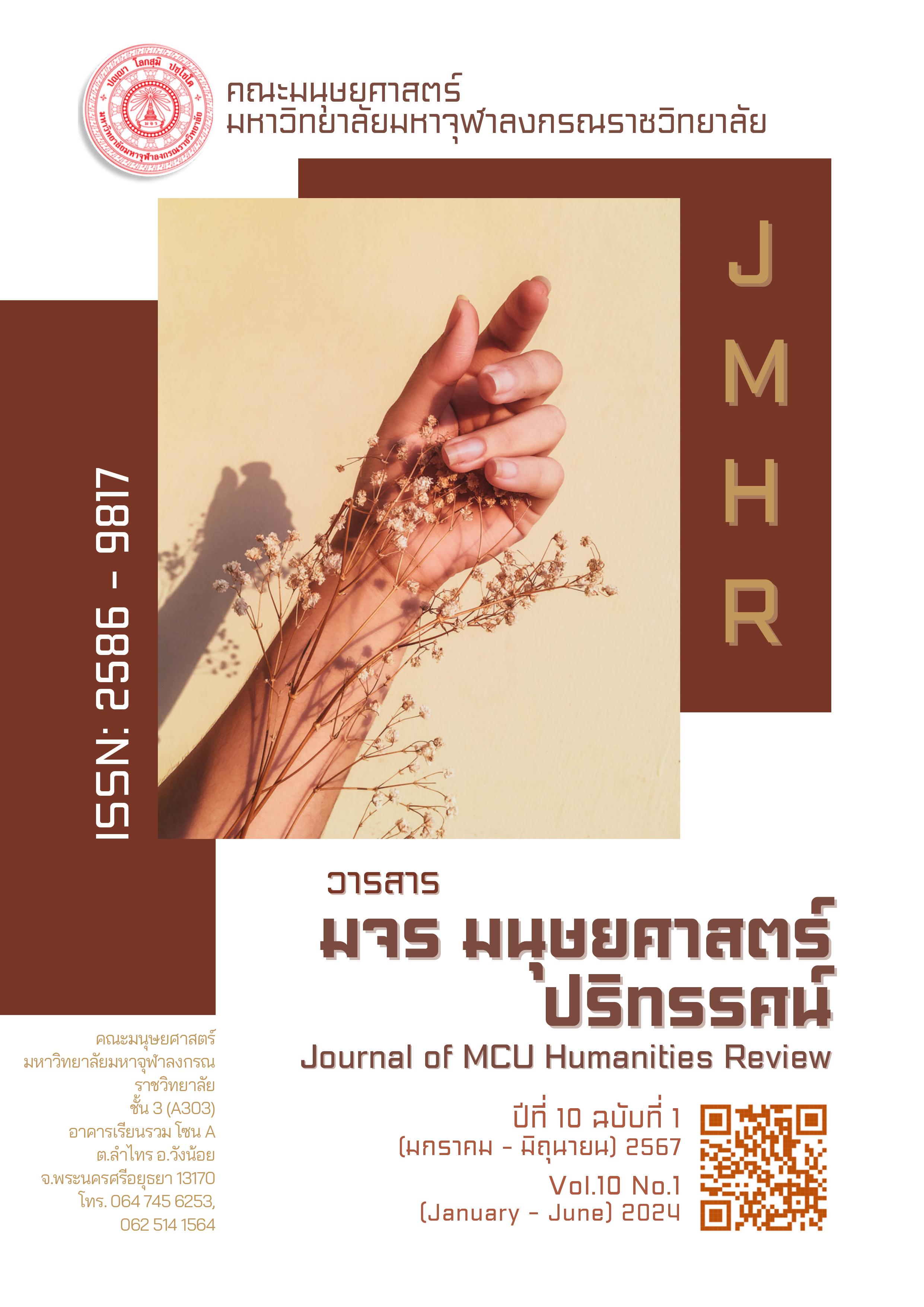รูปแบบพุทธจิตวิสัยเพื่อส่งเสริมจิตอาสาของเครือข่ายเสริมสร้างวัคซีนใจ ในชุมชนภายใต้สถานการณ์วิกฤติ
คำสำคัญ:
พุทธจิตวิสัย, จิตอาสา, เครือข่าย, การเสริมสร้างวัคซีนใจ, สถานการณ์วิกฤติบทคัดย่อ
การวิจัยนี้มีวัตถุประสงค์ 1. เพื่อศึกษาแนวคิดและคุณลักษณะของรูปแบบพุทธจิตวิสัยเพื่อส่งเสริมจิตอาสาของเครือข่ายเสริมสร้างวัคซีนใจในชุมชนภายใต้สถานการณ์วิกฤติ 2. เพื่อสังเคราะห์รูปแบบพุทธจิตวิสัยเพื่อส่งเสริมจิตอาสาของเครือข่ายเสริมสร้างวัคซีนใจในชุมชนภายใต้สถานการณ์วิกฤติ 3. เพื่อนำเสนอรูปแบบพุทธจิตวิสัยเพื่อส่งเสริมจิตอาสาของเครือข่ายเสริมสร้างวัคซีนใจในชุมชนภายใต้สถานการณ์วิกฤติ เป็นการวิจัยแบบผสานวิธี การวิจัยเชิงปริมาณ ประชากร คือ เครือข่ายในชุมชนที่สังกัดเขตบริการสุขภาพอำเภอวังน้อย จังหวัดพระนครศรีอยุธยา กลุ่มตัวอย่าง จำนวน 244 คน โดยใช้แบบสอบถาม (Questionnaire) การวิจัยเชิงคุณภาพ ใช้การสัมภาษณ์เชิงลึก (in-depth interview) ผู้ให้ข้อมูลสำคัญ จำนวน 17 คน ร่วมกับการสังเกตการณ์แบบมีส่วนร่วม (Observation participant) การสนทนากลุ่ม (Focus Group) เพื่อประเมินรับรองรูปแบบ และการประชุมเสวนาผู้เชี่ยวชาญพิเศษ (Connoisseurship ) วิเคราะห์ข้อมูลเชิงคุณภาพด้วยเทคนิควิจัยแบบสามเส้า, Data Saturated และเทคนิค 6’ C Technic Analysis)
ผลการวิจัยพบว่า
- รูปแบบพุทธจิตวิสัยเพื่อส่งเสริมจิตอาสาของเครือข่ายเสริมสร้างวัคซีนใจในชุมชนภายใต้สถานการณ์วิกฤติ ประกอบด้วย 1) แนวคิดและคุณลักษณะด้านแรงจูงใจใฝ่อาสาสมัคร 2) สภาพแวดล้อมทางสังคมที่ดี 3) จิตอาสาสาธารณะจิตกุศล 4) หลักพรหมวิหาร 4 และสังคหวัตถุ 4 5) ลำดับขั้นความต้องการของมนุษย์ 6) กระบวนความคิด 2 แนวทางปรับความคิดและเจตคติด้วยใจไม่ต้องการสิ่งตอบแทน 7) มองเห็นคุณค่าในตนเอง ในงานและในชุมชน
- การสังเคราะห์รูปแบบงานพุทธจิตวิสัยเพื่อส่งเสริมจิตอาสาของเครือข่ายเสริมสร้างวัคซีนใจในชุมชนภายใต้สถานการณ์วิกฤติ ขั้นตอนที่ 1 การบูรณาการหลักจิตวิทยาลำดับขั้นความต้องการของมนุษย์และหลักจิตวิทยากระบวนความคิด 2 แนวทาง กับหลักพรหมวิหาร 4 และสังคหวัตถุ 4 เพื่อสร้างคุณลักษณะจิตอาสา 3 ด้าน คือ 1) ด้านจิตสาธารณะสร้างสรรค์ที่เป็นกุศล 2) ด้านจิตคิดบวก และ 3) ด้านจิตสำนึกดีมีศีลธรรม ขั้นตอนที่ 2 พัฒนากิจกรรมสร้างคุณลักษณะพุทธจิตวิสัยภายใต้ 4 โมดูล คือ 1) คุณลักษณะพุทธจิตวิสัย 6 ส 2) คุณสมบัติเครือข่าย 6 มี 3) มิติการพัฒนาสมดุลชีวิต 4 มิติ และ 4) ปรับเปลี่ยนกระบวนความคิดทางปัญญา 5 ปรับ และขั้นตอนที่ 3 ปฏิบัติการสร้างคุณลักษณะพุทธจิตวิสัย
- รูปแบบพุทธจิตวิสัยเพื่อส่งเสริมจิตอาสาของเครือข่ายเสริมสร้างวัคซีนใจในชุมชนภายใต้สถานการณ์วิกฤติ เป็นแบบจำลองของขั้นตอนการพัฒนาคุณลักษณะพุทธจิตวิสัย 3 ขั้นตอน โดยใช้โมดูลกิจกรรมการพัฒนาคุณลักษณะพุทธจิตวิสัย 4 โมดูล
เอกสารอ้างอิง
กรมสุขภาพจิต. (2564). หลักสูตรการสร้างความเข้มแข็งในชุมชนเพื่อรองรับสถานการณ์วิกฤต. กรุงเทพฯ : กองบริหารระบบบริการสุขภาพจิต กรมสุขภาพจิต.
กองสุขศึกษา. (2556). การสร้างเครือข่ายและการมีส่วนร่วมในการปรับเปลี่ยนพฤติกรรมสุขภาพของชุมชน. กรุงเทพฯ : กระทรวงสาธารณสุข.
ธีระพร อุวรรณโณ. (2546). เจตคติ: การศึกษาตามแนวทฤษฎีหลัก (พิมพ์ครั้งที่ 2). กรุงเทพฯ : จุฬาลงกรณ์มหาวิทยาลัย.
ประพันธ์ ศุภษร. (2555). กระบวนการพัฒนาจิตอาสาตามแนวพระพุทธศาสนา (รายงานผลการวิจัย). บัณฑิตวิทยาลัย: มหาวิทยาลัยมหาจุฬาลงกรณราชวิทยาลัย.
พระธรรมปิฎก (ป.อ. ปยุตฺโต). (2536). งานเพื่อความสุขและแก่นสารของชีวิต (พิมพ์ครั้งที่ 3). กรุงเทพฯ : พิมพ์สวย.
พระพรหมคุณาภรณ์ (ป.อ. ปยุตฺโต). (2559). พจนานุกรมพุทธศาสตร์ ฉบับประมวลธรรม (พิมพ์ครั้งที่ 34). กรุงเทพฯ : มูลนิธิการศึกษาเพื่อสันติภาพ.
“________”. (2553). พจนานุกรมพุทธศาสน์ ฉบับประมวลศัพท์ (พิมพ์ครั้งที่ 15). กรุงเทพฯ : โรงพิมพ์ บริษัท สหธรรมิก จำกัด.
พระไพศาล วิสาโล. (2549). เครือข่ายจิตอาสา. กรุงเทพฯ : ศูนย์ประสานงานเครือข่ายจิตอาสา.
“________”. (2542). พระธรรมปิฎกกับอนาคตของพุทธศาสนา. กรุงเทพฯ : ธรรมสาร.
พระมหาหรรษา ธมฺมหาโส. (2554). พุทธสันติวิธี การบูรณาการหลักการและเครื่องมือจัดการความขัดแย้ง. กรุงเทพฯ : 21 เซ็นจูรี่.
พุทธทาสภิกขุ. (2525). พุทธศาสนากับคนรุ่นใหม่และสังคมไทยในอนาคต. กรุงเทพฯ : สำนักพิมพ์สุขภาพใจ.
มกราพันธุ์ จูฑะรสก. (2551). กระบวนการเรียนรู้จิตบริการด้วยหัวใจความเป็นมนุษย์ภายใต้ระบบครอบครัวเสมือน. ขอนแก่น : คลังนานาวิทยา.
สัมพันธ์ คงพูนทรัพย์. (2560). การใช้หลักพุทธธรรมในการทำงานจิตอาสา. Journal of Roi Kaensarn Academi, 2(1) (มกราคม-พฤษภาคม 2560), 1-14.
ดาวน์โหลด
เผยแพร่แล้ว
รูปแบบการอ้างอิง
ฉบับ
ประเภทบทความ
หมวดหมู่
สัญญาอนุญาต
ลิขสิทธิ์ (c) 2024 วารสาร มจร มนุษยศาสตร์ปริทรรศน์

อนุญาตภายใต้เงื่อนไข Creative Commons Attribution-NonCommercial-NoDerivatives 4.0 International License.






